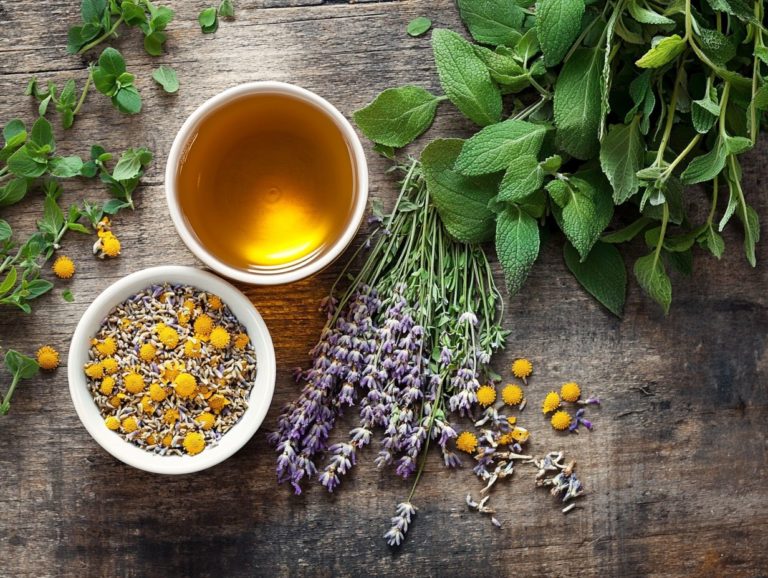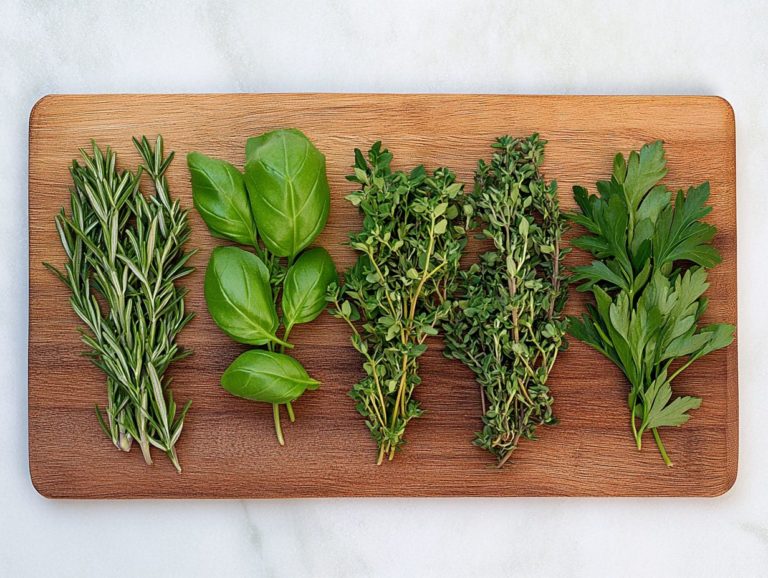The Importance of Sage in Herbal Medicine
Sage, a vibrant herb with rich historical significance, has earned its place in herbal medicine for its impressive health benefits. From enhancing cognitive function to acting as a natural remedy for a variety of ailments, sage transcends its role as merely a kitchen staple.
This article delves into its essential medicinal properties, various uses, and preparation methods, while also discussing potential side effects and interactions.
Discover the incredible benefits of this herb! Immerse yourself in this exploration to see how sage can elevate your health and wellbeing!
Contents
- Key Takeaways:
- Health Benefits of Sage
- How to Use Sage in Herbal Medicine
- Potential Side Effects and Interactions
- Other Uses for Sage
- Frequently Asked Questions
- What is sage and why is it important in herbal medicine?
- How does sage benefit the body in herbal medicine?
- Can sage be used for skin issues?
- Is sage safe to consume in herbal medicine?
- Can sage be used as a natural remedy for respiratory issues?
- How can sage be incorporated into herbal medicine practices?
Key Takeaways:
- Sage has been used in herbal medicine for centuries and has a rich history in treating various ailments and promoting overall health.
- Sage fights inflammation, bacteria, and oxidative stress making it a powerful ally for your health.
- When using sage in herbal medicine, it’s important to follow proper preparation methods and dosages, be aware of potential side effects and interactions, and explore other uses such as cooking and aromatherapy.
What is Sage and its History in Herbal Medicine?
Sage, scientifically known as Salvia officinalis (the scientific name for sage), is an aromatic plant that has graced the world of herbal medicine for centuries. This remarkable herb commonly referred to as common sage offers a wealth of applications, from enhancing the flavor of your favorite dishes to potentially providing health benefits due to its impressive nutritional content and medicinal properties.
Its historical significance spans various cultures, where sage has been revered not just for its delightful taste but also for its healing attributes. In ancient Rome, sage was seen as a symbol of wisdom and played a role in rituals and ceremonies. Meanwhile, indigenous tribes in North America incorporated sage into smudging rituals, believing it had the power to cleanse spaces of negative energy.
Throughout history, herbalists have harnessed sage’s potent antioxidants and anti-inflammatory qualities to address ailments ranging from digestive issues to respiratory conditions. This demonstrates its lasting importance in both traditional and contemporary health practices.
Health Benefits of Sage
Sage is celebrated for its remarkable health benefits, offering a range of medicinal uses that go far beyond its culinary reputation. You may find its potential effects on memory enhancement, regulation of blood sugar levels, and alleviation of menopausal symptoms particularly appealing. This versatility makes sage a sought-after natural product in both dietary supplements and herbal medicine.
Key Medicinal Properties
The key medicinal properties of sage are truly remarkable, offering potent antioxidant benefits, antimicrobial effects, and a rich composition of polyphenols. These attributes significantly contribute to its effectiveness in both traditional medicine and modern herbal practices, particularly through the essential oil and extracts derived from Salvia officinalis.
You ll find that sage is particularly renowned for its high content of thujone, a natural compound found in sage that may help with brain function. Thujone stimulates the central nervous system and is believed to enhance cognitive function, which is why sage has been embraced in memory-supporting tinctures.
Its antioxidative properties largely stem from its polyphenolic compounds, working diligently to combat free radicals in your body and potentially reducing the risk of chronic diseases. Sage also helps fight infections due to its strong antimicrobial properties, making it a valuable ally in your health.
Incorporating sage into your daily practices allows it to serve as a multifaceted herbal remedy, enriching your wellness journey.
Ready to harness the power of sage? Start incorporating it into your meals today!
Specific Uses and Applications
Sage is packed with incredible uses that can transform your health! It offers specific applications in both culinary and medicinal contexts. You can enjoy a soothing cup of sage tea to support digestive health. Alternatively, you can rely on it to alleviate hot flashes and promote oral health. This illustrates its remarkable versatility as a dietary supplement in herbal medicine.
In the kitchen, this aromatic herb enhances your dishes with its robust flavor, making it a cherished ingredient in a myriad of recipes, from savory stuffed meats to fragrant soups. Sage doesn t stop at culinary excellence; it s also recognized for its potential to elevate mood and improve cognitive function. This makes it an invaluable addition to any diet focused on boosting mental clarity.
In the world of traditional herbal medicine, sage is frequently utilized for its anti-inflammatory and antioxidant properties, underscoring its importance as a natural remedy for various health conditions. Its multifunctional nature not only enriches your meals but also contributes significantly to your overall well-being.
How to Use Sage in Herbal Medicine
Utilizing sage in herbal medicine offers a wealth of preparation methods and dosage options, giving you the power to fully harness its health benefits.
Whether you choose to enjoy a soothing herbal infusion like sage tea or opt for more potent forms such as the essential oil extracted from Salvia officinalis, you can tailor your approach to meet your personal wellness goals.
Methods of Preparation and Dosage
The preparation methods for using sage can vary quite a bit. Whether you re brewing a comforting sage tea or utilizing sage essential oil, each approach has its own specific dosages to ensure both efficacy and safety as a dietary supplement.
If you re interested in brewing sage tea, consider steeping one to two teaspoons of dried leaves in hot water for about 10 minutes. This creates a soothing beverage that may enhance your digestive health and provide anti-inflammatory benefits.
On the other hand, if sage essential oil is more your style, a few drops can be diluted in a carrier oil which is a base oil used to dilute essential oils for topical application. Just remember to conduct a patch test first to avoid any unpleasant skin reactions.
In terms of preparing tinctures, which are concentrated herbal extracts, from fresh or dried sage leaves, a common guideline is to use a 1:5 ratio of herb to alcohol, allowing it to steep for two to four weeks.
Always consult reliable sources or healthcare professionals for appropriate dosages and safety precautions, especially when it comes to children or pregnant individuals. Your well-being deserves nothing less.
Potential Side Effects and Interactions
While you may appreciate the well-documented health benefits of sage, it’s crucial to remain mindful of potential side effects and interactions. This is especially true for concentrated forms, such as essential oil, which can pose health risks.
Be aware that poisoning from essential oils and complications related to its blood-thinning effects may affect certain individuals, warranting caution in its use.
Precautions and Warnings
Precautions and warnings regarding sage use are essential, especially when considering the health risks associated with excessive consumption or interactions with medications. Its blood-thinning effects can pose significant challenges for anyone on blood-thinning medications.
Before using sage essential oil, especially if you’re on medication, talk to your healthcare provider. It s crucial for your safety!
If you are pregnant or nursing, it may be best to steer clear of sage products altogether as they can disrupt hormonal balances. Additionally, performing a patch test for topical applications is a wise move to avoid any allergic reactions.
By taking these thoughtful precautions, you can relish the benefits of sage while effectively minimizing potential health risks.
Other Uses for Sage
Beyond its medicinal properties, sage offers a wealth of other benefits. It’s a culinary gem, renowned for enhancing flavors in a variety of dishes.
In aromatherapy, sage’s essential oil is celebrated for its soothing health benefits, making it a versatile addition to your wellness routine.
Culinary and Aromatherapy Applications
Sage is a culinary gem that you ll cherish for its unique flavor. It stands out in a variety of dishes.
This versatile herb elevates hearty meals like roasted meats, especially poultry and pork. Its savory depth is utterly irresistible.
Sage flawlessly complements rich sauces, stuffing, and vibrant vegetable medleys. It adds a warm, earthy undertone that enhances the overall flavor experience.
Its essential oil is a favorite in aromatherapy for its calming health benefits. When diffused, it creates an atmosphere of stress relief and relaxation, making it ideal for unwinding after a demanding day.
Whether you enjoy it in a comforting meal or its soothing scents, sage truly offers a well-rounded way to enjoy cooking and improve your mood.
Frequently Asked Questions
What is sage and why is it important in herbal medicine?
Sage is a perennial herb used for centuries in traditional medicine for its healing properties. It contains compounds with anti-inflammatory, antioxidant, and antimicrobial effects.
How does sage benefit the body in herbal medicine?
Sage provides numerous health benefits. It can improve memory and brain function, aid digestion, relieve menopausal symptoms, and boost the immune system.
Its anti-inflammatory and pain-relieving properties make it effective for treating conditions like arthritis and sore throat.
Can sage be used for skin issues?
Yes! Sage can help with skin health. It can treat acne and eczema thanks to its anti-inflammatory and antimicrobial properties.
It can also be used topically to help heal wounds and reduce inflammation.
Is sage safe to consume in herbal medicine?
When used in recommended amounts, sage is generally considered safe. However, pregnant and breastfeeding women should avoid using sage, as it may stimulate the uterus and affect hormone levels.
Consult with a healthcare professional before using sage if you have pre-existing medical conditions.
Can sage be used as a natural remedy for respiratory issues?
Yes, sage has been traditionally used to treat respiratory issues such as coughs, colds, and sore throats. It helps break down mucus, relieving congestion.
With its antibacterial properties, sage is effective for treating infections that cause respiratory issues.
How can sage be incorporated into herbal medicine practices?
Sage can be used in various forms, including teas, tinctures, extracts, and capsules. It can also be used topically as essential oil or compress.
Consult with a trained herbalist for proper dosages and combinations to enhance its effects.





